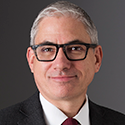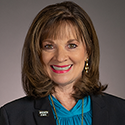
After a 33-year career at Wichita State University, Elizabeth King is retiring as president and CEO of Wichita State University Foundation and Alumni Engagement. In this podcast, Elizabeth and David Bass, AGB executive director of philanthropic governance, discuss shifting trends in advancement, cultivating a culture of philanthropy, best practices for working with your foundation board, and advice for future foundation leaders.
Aired: October 3, 2023
Opinions expressed in AGB podcasts are those of the speakers and not necessarily those of the organizations that employ them or of AGB.
Podcast Transcript
Introduction:
Welcome to the Trusteeship Podcast from AGB, the Association of Governing Boards. We cover everything higher education leaders need to know about the challenges facing our nation’s colleges and universities. More important, we provide the facts and insight you need to solve those challenges and to be the storytellers and advocates higher education needs.
After a 33-year career at Wichita State University, Elizabeth King is retiring as president and CEO of Wichita State University Foundation and Alumni Engagement. In this podcast, Elizabeth and AGB’s Executive Director of Philanthropic Governance, David Bass, discuss shifting trends in advancement, cultivating of culture of philanthropy, best practices for working with your foundation board, and advice for future foundation leaders.
David Bass:
Thank you for joining us today. I’m David Bass, AGB’s executive director for philanthropic governance. I’m delighted to be joined today by Elizabeth King. Elizabeth will be retiring in January after an extraordinary 33-year career. She started as vice president for university advancement at the Wichita State University. In 2007, she became president and CEO of the Wichita State University Foundation and Alumni Engagement team.
Elizabeth has generously agreed to join us today to share her insights on foundation leadership and the way public higher education advancement has evolved over the past three decades. Her career corresponded to a period in which public higher education fundraising has grown enormously in both scale and sophistication. The year prior to Elizabeth’s arrival at Wichita State, the university raised $6 million. That’s grown to an average of 50 million per year over the past three years. During the same period, the endowment has grown from about 54 million to more than 400 million. King’s career at Wichita State also reflects some of the ways that the structure of public institution advancement programs have evolved, with foundations assuming an increasingly important role in philanthropic leadership with advancement programming becoming a little more closely integrated, and in some cases with foundation and alumni associations actually merging.
Elizabeth, I’d like to start with some questions about the way you’ve seen higher ed advancement and philanthropy evolve over the course of your career. Over the past three decades, state support has declined as a proportion of revenue, tuition has grown, and philanthropy has become a critical source of support for student financial aid, faculty and programs and capital projects that are certainly not marginal, but are now really mission-critical for institutions. The roles played by affiliated foundations and their boards have evolved as well. What are the biggest changes or trends you’ve seen play out in higher education advancement during your three decades in the profession?
Elizabeth King:
Well, David, let me start by saying thank you for that very generous introduction and you have been such a valued friend and colleague and I really do appreciate your leadership in this space that we all work in. When you talk about my longevity, I think there’s actually two reasons for that. And I’ll come to your question, but when I moved to Wichita, I moved to marry my husband who had a company that was not mobile, and so then all of a sudden I was not mobile. And I did start quite young, but those opportunities that many of my colleagues have had to move into bigger programs, I was not able to do that. But in the essence of those opportunities, I really feel it has been a blessing in my life to have spent my entire professional career practically at one institution. And that is one of the changes I have seen. And that is that people who are successful as a whole are more mobile, and there was a day when in philanthropy and development work people stayed at the same institution.
So some of the other changes. Bigger campaign goals, universities are becoming much more reliant, public universities more so than ever on philanthropy. You mentioned about our merger, but there are more mergers of foundations and alumni associations today. There are fewer donors, but bigger gifts. And as we know, as landlines have pretty much been eliminated, annual giving campaigns have struggled to figure out how do you connect with people who no longer answer their telephones when they know we’re calling.
There’s more holistic alumni engagement. At least at our university, our graduates are not as engaged by class year as they are with their cohorts by major or by their social gathering group, whether it’s fraternities or student government because they don’t see people in other disciplines as much by class year. But fundamentally, what has not changed is that we are still in a relationship business. And so all these other things have changed around us. The world has dramatically changed, but when you come down to working with your alumni, working with your donors, engaging with those who are special to you as a university, it’s all about building trust and building relationships.
David Bass:
How has the role of the Wichita State Foundation and the role of the foundation board evolved?
Elizabeth King:
When I began my career, I reported directly to the president and yet I was CEO of the foundation, so I worked with the foundation board heavily. I’ve worked with 16 board chairs and six presidents, and today I think the issues are just so much more complicated. Back when I started, our endowment assets were smaller, but it was just pretty simple and now the whole investment world is complicated. We didn’t know anything about private equity in those days, and now it’s a huge driver of performance.
I also think that just as our lives have become more complicated, our board members’ lives have as well. So we have to be extremely cognizant of their busyness so that when they are working with us, they feel productive. Otherwise, they won’t give the time. They’re not going to sit on a board just to have a name on a board, and that’s a big difference to me.
David Bass:
What have been the big game changers that have had the most significant impact on Wichita State’s advancement work and on the university itself?
Elizabeth King:
In terms of the advancement work, two big organizational changes. So after 15 years of carrying dual roles, we went to a completely holistic model where the foundation. We only get 3% of our whole budget from the university. That was a big shift for me personally, but also for the university. And then this past year we did a full integration of the alumni to become a part of the foundation and it’s gone super, super well. So those have been huge changes for us as both a university and as a foundation.
David Bass:
You’ve worked with six different presidents, I think, during your time at Wichita State. What sets apart the best fundraisers?
Elizabeth King:
I’ll just tell you about the president with whom I’m working right now, Dr. Rick Muma. He is a phenomenal partner to work with our team. I’ve worked with him for 25 years. He has a big vision. He is a great listener. He came up through the medical ranks. He’s very humble and confident. He’s a fixer, so that medical background, but he’s fun and he trusts me. I’m respectful of his time, but if I meet him, all I have to do is text and say, “This is super important,” and he will rearrange his schedule. I think that level of compatibility and trust is invaluable for a successful president working with somebody in my role. He tells stories that connects with the donors. So if we’re talking about being an institution that creates a pipeline for the workforce, he’ll give examples of what we’ve done to move that student from 18 years old to being in internships through their whole time here with us and then being a functioning engineer or finance person or whatever it is. So he’s a great storyteller. Those are just some of the qualities I think are important.
David Bass:
We’re anticipating a wave of presidential transitions in the coming year. What advice would you give a new college president having seen a good number of them yourself?
Elizabeth King:
Two pieces of advice. One is bring your CEO foundation or your VP, whatever your model is, bring that person into the conversation on the front end. And if we’re brought in on the front end, sometimes we can bring in donors on that front end too, so they feel part of that process. And then by the time that that whole concept has been developed therein—but don’t have us come in at the tail end and expect for miracles to occur. And secondly, I would encourage a president to really push hard on the provost or VP for academic affairs to hold deans accountable for fundraising because a good fundraising dean can be phenomenal in changing the culture of his or her college.
David Bass:
It sounds to me like you’re actually describing something that’s not exclusively about presidential leadership, but about fostering a broader-based campus culture of philanthropy.
Elizabeth King:
Yes, for sure.
David Bass:
What are some other factors that you think advancement leaders can look to help build a culture of philanthropy?
Elizabeth King:
We’ve worked with our provost to have it be one of the areas about which our deans are held accountable with their annual evaluation. We also do training so that our deans and our development team are working hand in hand. We have assigned development directors to various academic units and we do training. So we can’t expect them to just know, and they’ve gone to away training where deans and directors go together. Also, the VP for development and I, every May or June, we hop in a golf cart and we spend a day or day and a half and go visit every single dean, find out what’s working, what’s not working. We’ve added in now our VP for finance because we want to make sure they’re reporting that what we’re providing is helpful. And now we’re going to add our VP for alumni to just pull everybody together, but we do these annual checks with them. That’s not the only time that we meet with them, but it is intentional to find out from their perspective how we’re doing and working with them.
David Bass:
How else do you use volunteers? Excluding the foundation board, which we’ll get to in a second, but how else do you use volunteers and leverage the power of volunteers at Wichita State?
Elizabeth King:
Oh, we have advisory boards for every college, but one I think, and we have… I’ll back up to a little bit about our structure. We have 105-member national advisory council, and from within that we have a 19-member voting board of directors that has the fiduciary and legal responsibility for us. But twice a year, the 105 people are invited to campus and we have it all day where they hear reports, but also we have sessions where we break them into small groups and we get input from them. We have worked then with our deans so that these volunteers, when they’re here, most of them now are assigned on a college advisory board. So they finish our meetings, they go to the college advisory board meetings, and they get more into their very specific career area or degree, major area.
David Bass:
That’s terrific. I’m curious about some other benefits of that structure that you have where you have a very large volunteer leadership group and much smaller fiduciary board. That’s a lot of care and feeding, as you point out. You need to provide meaningful, substantive, rewarding volunteer roles for them, not just give them a dinner a couple times a year, but are there other benefits to that structure in terms of creating a pipeline of future fiduciary board members of helping to diversify your volunteer leadership?
Elizabeth King:
Absolutely. So besides the twice a year, they’re the first to receive when we have new news. We’ve hired the baseball coach. They’re going to get that news release before it goes to the public. So they do feel a part. They get invited once a year to a very small intimate time with the president and myself breakfast or lunch, and if they’re out of state, it’s a Zoom meeting. We’ve added that now and they can talk about anything they want to talk about because it’s a private meeting and they again, feel real connected with us. And then they also serve on committees for us. So we have an operations committee, investment committee, we have a museum committee. We just have a lot of various development committee. So those people serve on those committees. They are not governing committees, but they volunteer and support our organization. So what we find is we can observe are they giving of their time? Are they giving of their personal resources? Are they engaged with us and will they make good board members? And it is a feeder team to our board.
David Bass:
That’s terrific and I would think a great force multiplier for the advancement team as a whole. I’d like to ask you, we’re seeing a wave of presidential transitions. We’re also seeing increased rate of turnover among foundation CEOs. A couple pieces of advice I’d like you to share. One, first off, what advice would you give to boards as they think about succession planning?
Elizabeth King:
Our board has obviously not had to deal with this until now. Being in the same position for a while, you can get a little lethargic as a board.
About five years ago, my board took seriously the inequity of my salary and they took the time to hire a firm and do a salary comp and found that I was in the 20th percentile for like type institutions. So now I am way up into the 75th percentile, and one thing we’re learning is that CEO salaries are really high right now. And the boards are going to have to make decisions to hire really good people who are performing and earning that level. But money is just not everything. We know that from every survey about working with people. Their board members and presidents need to support their foundation CEO. And by support, come alongside, because foundation CEOs do not have peers within the university in the exact same way. And there’s always people wondering, “Well, why are you not raising money for my program and whatever?” And just having that constant thought of, “We’re with you. How can we help?,” makes a huge difference in job satisfaction.
David Bass:
That’s really helpful. I think some of the issues that you’ve been touching on are going to be front and center for foundation boards in the years ahead, thinking about how to provide both more competitive compensation for their chief executives, as well as other forms of retention and incentive support. The other question that you alluded to, which is really the role of the board as a strategic partner to the chief executive is something I’d like to explore a little bit. At AGB, we often talk about the leadership quartet. Sometimes it’s a trio, but essentially the chief executive of the foundation, the president or chancellor of the campus, and the chair of the governing board of the foundation, and if there is a campus board, the chair of the college or university board. How does that work at Wichita State? What has supported effective collaboration? What has gotten in the way of effective collaboration between those key leaders and the foundation and the institution more generally?
Elizabeth King:
Well, we are a trio in that our Kansas Board of Regents is a nine-member board over all public higher education in our state. So it’s our president and our foundation board chair and myself. I serve as an invited member of the president’s executive team, and I’m on his strategy team, which is the smaller group, which is great because I really am able to be on the front end of decisions. Then he comes to our foundation board meetings. He’s always on the agenda to share whatever and be part of our decisions. I think one of the things that we have done that’s been really helpful, and we did not start this until this president because he was so amenable to it. Every other month we have lunch with the chair elect, the chair, and the immediate past chair, the president and myself. And we just go to lunch and talk about whatever the president is struggling with. It gives him a sounding board of really smart executives to talk about issues that he can’t necessarily talk to his board about or to others about when it’s still percolating in his head.
David Bass:
That echoes something I’ve heard from a lot of CEOs, which is that the foundation board is the board you want. It’s the board that you can recruit with a goal towards being strategic advisors, and it’s terrific that your president is tapping them in that way. It also seems like it’s a great way to ensure some continuity and succession within the board. You mentioned having a chair, prior chair, chair and chair elect, and that’s something else that we’re starting to see among foundations is thinking about ways to ensure continuity and succession within the board. I’d like to close by asking you to share three pieces of advice for a young professional, just starting in a career in advancement.
Elizabeth King:
When I’m talking to prospective people who want to move into, whether it’s alumni work or directly to the development side, then I say start. Just get started if you can. My passion is higher education. It is not the not-for-profit world, and we are different. So I always try to encourage people, try to get started in a college or university advancement program. And then there’s just no substitute for hard work. So work hard and make sure that you are a consummate team player because the team players always get farther ahead than those that are building their own resume and are trying to work in vacuum. And then everything you do, do it at the highest of integrity, don’t cut corners. Make your word your bond. Always be somebody that can be relied upon that if you say you’ll have something done by a certain point you’ll have it done by then. Whether you’re dealing with the donor or with your boss or with your colleague, you’re always a person of high integrity. That’s probably the most important advice I have.
David Bass:
Any different advice for people who are going to be transitioning into a chief executive role? Assuming responsibility for a board in a senior most staff position and probably working with a board directly and perhaps reporting to a board for the first time?
Elizabeth King:
The integrity advice is still the same, absolutely, because you can’t lead an organization sustainably without having high integrity today. I feel so strongly about that. But as far as experience, I think one of the challenges is to go from being the person over development, for example, into the CEO role. There’s so much that you’ve not experienced. So if you are driving in that direction, then sit in on the investment committee, sit in on the budget planning committees, try to just grasp some of those concepts. Take some classes, go to AGB meetings and learn from other people, but just consistently learn, learn, learn so that when you’re in that senior role, find a mentor too. That’s always a good way to go about performing and learning, but just continually strive for excellence and strive to learn and adapt.
David Bass:
Always adapt.
Elizabeth King:
Always adapt. I think that’s why I’ve managed through 16 board chairs and six presidents. You have to be flexible. You have to learn. I tell new people all the time who may be struggling with a boss, I always say, “The bottom line is you have to adapt to them. They don’t have to adapt to you.”
David Bass:
Well, I know a lot of people feel very, very fortunate to have had you as a colleague and a friend, and a mentor and a member. So I will just say thank you for that on behalf of myself and so many others.
Elizabeth King:
Thank you, David. I do recognize that my time as the leader of the Wichita State University Alumni and Foundation is coming to an end. I am deeply grateful to have had this opportunity to serve a great university and to know that the work that we do each and every day is transforming lives. That is our mission, and that education transforms lives, and we are part of that mission. So I am blessed beyond measure.
David Bass:
Well, I know I am joined by many of your friends and colleagues who feel very, very fortunate to have had you in their lives as colleague, friend, mentor, member, volunteer. Thank you so much.
Elizabeth King:
Thank you, David.
David Bass:
Thank you so much, Elizabeth. It’s been a pleasure to talk with you today and a pleasure and honor to work with you over the past 20 years. We’ll be addressing many of the issues we touched on today in AGB’s 2024 Foundation Leadership Forum. The conference will take place January 28th through 30th at the Intercontinental Los Angeles Hotel in Los Angeles, California. Highlights of the conference will include a conversation with Walter Parkes, a motion picture producer, writer, former studio executive and co-founder and CEO of Dreamscape Immersive. You all know Parks as a producer of Gladiator, Minority Report, the Men in Black series, Free Solo, Catch Me if You Can, The Kite Runner, Amistad, and many other films. You may not know that he has been working with Arizona State University to redefine remote and in-person learning through the implementation of emotional narrative and mixed reality technologies. We’ll learn more about this and explore the ways campus and foundation leaders can leverage insights from cinematic narrative techniques to better tell the story of public higher education. I hope to see you at the forum in January. Thank you very much.
Conclusion:
David and Elizabeth, thank you so much for joining us today and for your insights. To read more about Elizabeth’s extraordinary career at Wichita State University, please see the September/October 2023 issue of Trusteeship magazine, available at AGB.org/trusteeship.
Speakers

David Bass
Executive Director of Philanthropic Governance
AGB
David Bass provides thought leadership on board governance and best practices that relate to philanthropy in higher education. He oversees the development of programs and resources supporting institutionally related foundation boards, institutional governing boards, and other senior staff and volunteer leaders involved in higher education fundraising and stewardship. David previously served as AGB’s director of foundation programs and research.

Elizabeth King
President and CEO
Wichita State University Foundation and Alumni Engagement
Elizabeth King started her tenure at Wichita State University in 1991 as vice president of advancement and CEO of the foundation. She was the second female vice president in Wichita State’s history. In 2007, she was appointed president and CEO of the foundation and now serves the recently merged foundation and alumni engagement team in the same position. Since her arrival, the WSU Foundation has raised more than $900 million and grown its endowment from $53 million to over $400 million.



